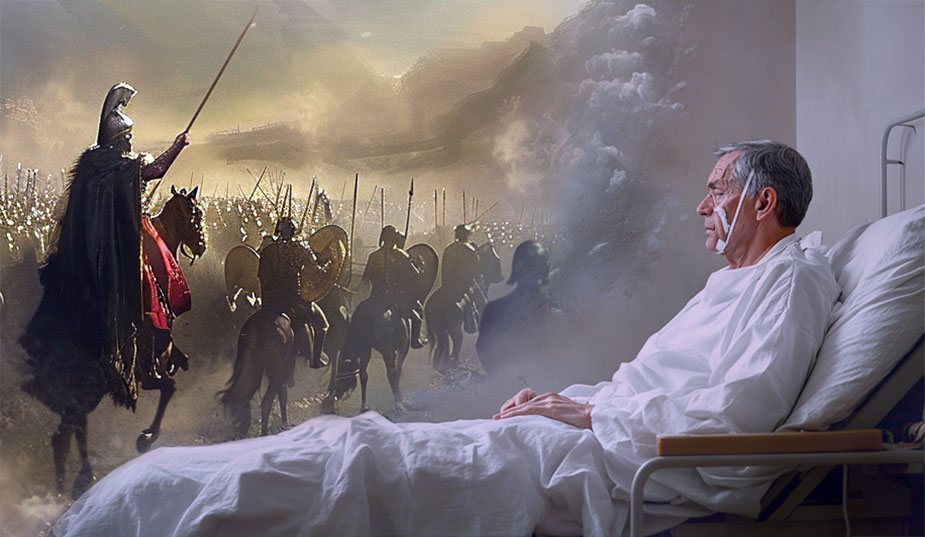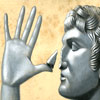Types Of Physical Karma
 by Ann Jaffin
by Ann Jaffin
Keep the physical fit that the soul may manifest the longer. 294-7
In her classic work on Edgar Cayce’s story of reincarnation and karma, Many Mansions, Dr. Gina Cerminara divided physical karma into three categories: boomerang, organismic, and symbolic. As the name indicates, boomerang karma is an action toward another person that rebounds to the originator of the action. Organismic karma occurs when someone misuses a bodily organ in one life and inherits difficulty with the same organ in another life. Symbolic karma is more subtle and is seen when a past-life wrong yields a more general, chronic, and illusive bodily challenge in a later life. As we explore examples of physical karma from the Cayce readings, we will see some examples of these three different types.
Cayce’s Karmic Conditions
. . . all illness is sin; not necessarily of the moment, as man counts time, but as a part of the whole experience. 3395-2
Edgar Cayce is perhaps most famous as the “father of holistic medicine.” In addition to the physical relief Cayce’s readings brought to so many suffering souls, the readings’ insightful spiritual and mental counsel, together with their past-life and interplanetary information, wove a complete and unique tapestry of the true cause of illness. As we look at some specific examples of physical karma from the readings, we can see some of these threads.
Acne, allergies, anemia, asthma, bed-wetting, blindness, bronchitis, cancer, deafness, eczema, epilepsy, foot problems, gonorrhea, hypertension, insanity, melancholia, multiple sclerosis, muscular dystrophy, obesity, paralysis, Parkinson’s disease, polio, and possession—the Cayce readings describe the influence of karma in an amazing array of diseases and health concerns. However, we must keep in mind that these readings were given for specific individuals and that each of us is unique. Although we can’t always generalize from these cases, some of the approaches may be helpful in healing our own ills:
A forty-year-old woman suffering with allergies was told that she had been a chemist in a prior life who used many things to produce itching in others. Cayce said, “She finds it in herself in the present!” (3125-2)
A twenty-one-year-old man was told about a life in a position of power in Peru. Cayce was terse in citing cause and effect: “much blood was shed. Thence anemia.” He added that this soul had learned “that service brought contentment, where power only brought dissension.” (4248-1)
A young boy with asthma was told that “one doesn’t press the life out of others without at times seeming to have same pressed out of self.” (3906-1)
A man struggling with increasing deafness was told not to “close the ears, the mind or the heart again to those who plead for aid . . .” (3526- 1)
A twenty-three-year-old woman asked what karma was causing her eczema. Cayce answered that the cause was “resentments in regard to those not thinking as self.” (2872-3)
Sol Hambeing was the former name of a man now suffering with foot problems. He journeyed west in the gold rush of 1849 and gained much wealth but lost spiritually: “Not taking from [others] directly—but running over many to attain same . . . the feet . . . [have] brought much in of that suffered in that experience.” (99-6)
Cancer
. . . each soul manifesting in the earth is the result of that the entity has been, in its use of its opportunities, in its relationship to God the Father. 3121-1
Cancer is one of the most feared words in the English language. Although this reading begins by stating that this man’s cancer is karmic, no past-life information is given. However, in his letter requesting a reading, he says that he was born with a tumor on his leg. An inborn illness is likely a past-life carry-over. The reading states that if he dedicated himself to God, he would find healing.
. . . there are disturbing conditions. This disturbance is of a nature that by some would be called karmic. Hence it is something the body physically, mentally, must meet, in its spiritual attitude first; that is: as the body may dedicate its life and its abilities to a definite service, to the Creative Forces or God, there will be healing forces brought to the body.
This requires, then, that the mental attitude . . . not only proclaim or announce a belief in the divine, and to promise to dedicate self to same, but the entity must consistently live such. And the test, the proof of same, is long suffering. This does not mean suffering of self and not grumbling about it. Rather, though you be persecuted, unkindly spoken of, taken advantage of by others, you do not attempt to fight back or to do spiteful things; that you be patient—first with self, then with others; again that you not only be passive in your relationships with others but active, being kindly, affectionate one to the other . . . As oft as you contribute, then, to the welfare of those less fortunate, visit the fatherless and the widows in their affliction, visit those imprisoned—rightly or wrongly—you do it to your Maker. For, truth shall indeed make you free, even though you be bound in the chains of those things that have brought errors, or the result of errors, in your own experience. 3121-1
Hypertension
O what a jewel consistency must be in thine experience, if ye will but take it and use it and apply it day by day! 1537-1
In keeping with a central axiom of the readings that spirit is the life, mind is the builder, and the physical is the result, Cayce gave very stern advice about the attitudes of this thirty-eight-year-old man suffering from organismic karma. The reading stressed that he had lived extravagantly in many past lives and is still doing so.
But if ye are attempting to have thy physical body doing just as it pleases, thy mental body controlled by “What will other people say?” and thy spiritual body and mind shelved only for good occasions and for the good impressions that you may make occasionally, there cannot be other than confusion!
These . . . are not merely sayings; they answer to that which has been and is thy turmoil in the present. Look within!
Next, the Source hit the physical cause and effect hard. The man was told that this condition would kill him if he did not mend his ways and moderate his habits.
Ye are sensitive to things about you; because ye have lived not only in this experience but in many others a very extravagant life in every phase of your associations with your fellow man! . . . Have ye not found within—as in thine own body in the present—that the extravagance of thy living has produced those very inclinations that arise in thy digestive forces?
Thus thy high blood pressure that is produced within thy body arises from this overindulgence, this over-activity.
And unless ye make reparation these conditions will overcome thee. How may ye make reparation—by being what? Consistent! O what a jewel consistency must be in thine experience, if ye will but take it and use it and apply it day by day!
As to the material activities—keep away from those things that hinder—such as the effects of alcohol, the effects of riotous living, the effects of indulgence in those things that are of the nature of great quantities of stimulations; whether they be in condiments, excess of sugars, excess of this, that or the other. Or, as just given, be consistent! 1537-1
Multiple Sclerosis
But first the change of heart . . . 3124-2
And while to self in the present these conditions may not appear to be results of thine own self—whose body is afflicted? 2994-1
Perhaps the most unique and personally overwhelming thing about having a reading from Edgar Cayce was his uncanny ability to see right into one’s heart and mind. It was impossible to hide one’s true thoughts and feelings from his source. This man had two physical readings from Cayce. He was not only crippled but nearly blind from multiple sclerosis. He was married and had a five-year-old son. When he was diagnosed with this incurable disease, he attempted suicide.
There is correspondence about this case from the nurse who was caring for this man. She was intrigued with Cayce’s spiritual guidance and remarked in one letter that “the most perfect body without spiritual development is after all, only a healthy animal!” (3124-1, R1) A later letter from her showed how difficult this man was to help.
The young man is an enigma to me though I have done much social work, and have nursed in a psychiatric hospital for a good many years. He has courage and good sportsmanship, but he is one of the most emotional and self-centered people that I have ever known. You say that I must help him to see that he needs spiritual food as well as physical help. I have tried, Mr. Cayce, but I don’t think I have succeeded very well. He is touchy and closemouthed, and will say, “Don’t let’s talk about it. It is too deep a matter.” I can’t tell whether he feels a great deal, or not at all, except a burning desire to be physically whole again. We can’t force a person to see spiritual values by talking about it. That is one reason I have assumed the responsibility of continuing to do for him, though his lack of consideration to me (and others who are trying to help him) and his egotism have nearly worn me out. 3124-1, R8
Cayce’s reading for him cuts straight to the heart of the problem—his selfish attitudes. Since mind is literally the builder, this man’s thoughts were blocking his body’s ability to heal.
. . . this is a karmic condition and there must be measures taken for the body to change its attitude towards conditions, things and its fellow men. . .
When the body becomes so self-satisfied, so self-centered as to renounce, refuse, or does not change its attitude, so long as there is hate, malice, injustice, those things that produce hate, those that produce jealousy, those that produce that which is at variance to patience, long suffering, brotherly love, kindness, gentleness, there cannot be healing to that condition of this body.
. . . what would the body be healed for? That it might gratify its own physical appetites? That it might add to its own selfishness? Then (if so) it had better remain as it is.
If there is the change in mind, in intent, in purpose, and the body expresses same in its speech, its acts, and there is the application of those things suggested . . . we will find improvement. . .
But first the change of heart, the change of mind, the change of purpose, the change of intent. . .
All of the mechanical appliances that ye may muster will not aid to complete recovery unless thy purpose, unless thy soul has been baptized with the Holy Spirit.
In Him, then, is thy hope. Will ye reject it? . . . Thy body is indeed the temple of the living God. And what does it appear in the present? Broken in purpose, broken in the ability to reproduce itself! What is lacking? That which is life itself . . . the manifestation of that influence or force ye call God . . . Will ye accept, will ye reject? It is up to thee. We are through—unless ye make amends. 3124-2
Here we have another case of multiple sclerosis. Sadly, this thirty-five-year-old man was told that even with a great deal of effort, he might only progress enough to be able to take care of himself. In keeping with mind as the builder, he, too, was directed to begin his physical healing by working on his attitudes.
Now, while conditions are rather serious, they are long standing, and the condition has become progressive—we find that, with a great deal of care and patience, and persistence, the body may be able to care for itself—and to engage in activities that would be more in keeping with its purposes for its entering this material plane.
First, the attitudes of the body must be considered. While at times there have been hopes, these have gradually faded; and the body has at many times become very antagonistic to all that would pertain to a spiritual or mental attitude that would be helpful.
Resignation to the conditions does not necessarily mean patience on the part of the body. Know, deep within self, that God is not mocked. And while to self in the present these conditions may not appear to be results of thine own self—whose body is afflicted? Thy body is indeed the temple of the living God. What manner of worship hast gone on, then, in the real body? . . .
For, each anatomical structure, each atom, each vibration of each organ, must be able to rebuild itself—if there will be the returning of the elements for its recuperation to any extent. There must be created—in mind, in purpose, in body—those influences and forces that will resuscitate life itself in each cellular unit of the body . . .
That is the beginning then; thy attitude. 2994-1
Obesity
And too oft did the entity laugh at those less nimble . . . owing to their heaviness in body. 1339-2
With the growing obesity in our population, Cayce’s advice to this seventeen-year-old student “to take self in hand” is good advice for all of us. We can see the hand of organismic karma in this case.
. . . we find the entity was in the Roman and Grecian land, when there was the exchange of the games that were as part of what is now known as international or national athletic activity.
There we find the entity excelled in beauty, in the ability to carry in figure, in body, the games that were a part of the experience.
And too oft did the entity laugh at those less nimble of activity, owing to their heaviness in body.
Hence we find the entity not only meeting same in the present from a physical angle but there are the necessities of it being worked out by diet as well as outdoor activity.
Thus we find that in the present, from that experience, grace and beauty and the need for precautions become a part of what may be called . . . karmic forces.
Hence the necessity for the entity often taking self in hand and applying will in those directions that will make for a growth in mental, material and spiritual development.
For the necessity of such is a part of the experience of all, yet in the present experience for the entity—this entity—to enjoy the more of the material blessings as well as the personal satisfaction in being equal to others—it is necessary to take self in hand in those directions. 1339-2
Paralysis
The entity saw suffering, and the entity made light of same. 1215-4
Thoughts are indeed things. Again we see the role of past attitudes in this example of boomerang karma.
. . . we find the sojourn that is the more outstanding, as to the influences in the present.
It was during those periods when there were the persecutions of those who followed in the way of the teachings of the Nazarene.
The entity then was a Roman soldier, and one given rather to that of self-indulgence—and gloried rather in seeing the suffering of those who held to that principle.
And the entity fought in the arena and watched many that had met the entity fight again with the beasts . . .
The entity saw suffering, and the entity made light of same.
Hence the entity sees suffering in self in the present, and must again make light of same—but for a different purpose, for a different desire, for a different cause.
For again the entity meets self in that wished, that desired on the part of those against whom the entity held grudges. 1215-4
Parkinson’s Disease
Not in that attitude, “I didn’t cause it . . .” 3100-1
Sometimes it seems that the Source of the readings is being awfully harsh with the person who is ill. However, when we can view correspondence related to the case, we can gain additional insights about the person.
Elsie and Bill Sechrist became close friends of Edgar after being helped by their own readings. The man in the reading that follows, who was afflicted with Parkinson’s disease, was a patient at Bellevue Hospital in New York when Elsie was a nurse there. She suggested that he get a reading from Cayce, and she later provided additional information about his situation in a follow-up questionnaire.
. . . I met him [3100] in about 1932 . . . and at that time, his condition was just beginning to show. As time went on, he got worse and worse. I was with Bellevue [Hospital] at that time . . . I was so thrilled with my own results from the readings and my husband’s, that I talked to him about it and told him that I thought that this was a terrific opportunity for him; to get a reading and find out if there was an opportunity for him to be helped. Whether it was a karmic situation or not, I didn’t know . . .
(Q) Generally, what was his attitude towards life and pain? Would you consider him a spiritual man?
(A) No. He was so much of an introvert that there was very little discussion. But I knew from his attitude toward women that he was very sexually inclined, oversexed, as a matter of fact, and didn’t seem to care too much about what he left in his wake.
(Q) After he got the reading, did you go over it with him?
(A) We went over it together.
(Q) What was his reaction to it?
(A) He was very hopeful. He thought that maybe something could be done for him. I went into, especially, that passage there about having to change and I tried to analyze with him: What is your attitude toward this, what is your attitude toward that, toward women, etc. But he seemed to be so reticent in exposing himself that I was sort of frustrated. I didn’t feel like I could get to help him really in that particular angle. I know I told him over and over again, I said, “Now, [3100], judge yourself, analyze yourself, pray and meditate and see what it is that you are doing, or not doing, that you should do.”
(Q) The last time you saw him was when?
(A) I saw him in New York in January, 1952 . . . He was in a pitiful state . . . [He was] very bitter. I think this may show something regarding this mental condition . . . He walks the streets, as he told my husband, and sends out thoughts of hate towards these other older people because he can’t understand why they should be walking the streets, why they should be living, when his own mother was taken . . . 3100-1, R9
In this man’s reading, the Source was hard-hitting and very direct. He was told that his soul chose to enter this body because he merited the condition.
Thus, if there would be physical or material help, the body’s first approach will necessarily be the study of self.
Not in that attitude, “I didn’t cause it,” . . .
But rather consider that the self is being given an opportunity, here and now—if it will accept same—to interpret, to understand, and to be of help not only to self but in contributing something to the welfare of others in all their stages of development or seeking for physical, mental and spiritual help. . .
That there was the so-called meriting of this . . . understanding for this soul-entity, is indicated by the soul’s choice and use of this opportunity for entrance into material manifestation.
Then, as you chose it, as you needed it, do interpret it properly.
Do not become one that finds fault with others, condemns others. For, know—as given of old—“Though He were the Son, yet even He learned obedience through the things which He suffered. . .”
Use those abilities of the mind in such measures and manners as to be ever a contributing influence for the creating of peace, harmony, love, kindness, gentleness, hope, in the minds and in the hearts of all with whom you come in contact day by day.
These are the first prerequisites if you would find help.
If you cannot accept this, forget it all. Do not even begin. 3100-1
Polio
And the entity laughed at those who were crippled . . . 1504-1
Here we see another person from the Roman soul group. This housewife also encountered boomerang karma. The reading hints that those around this woman in the present were with her in that incarnation.
. . . the entity was in the Roman land, during those periods when there were persecutions of those who held to the tenet of the lowly Nazarene.
The entity was among those of the royalty, being closely associated with the activities of Nero—and of those that were in authority during the experience—in the persecutions by the beasts with which men fought.
And the entity laughed at those who were crippled by such activities; and lo, they return again to thee!
How blest then art thou, that there are those close to thee that ye once laughed at; that are patient, that are kind, that are gentle with thee!
Then condemn not thyself. Rather know that ye are experiencing, ye are knowing that . . . ye may see the love of the Father manifested among the children of men! 1504-1
Excerpt from Past Lives & Present Karma
See Part II here.
Posted in Other Topics, Past Life Therapy, Reincarnationwith no comments yet.






Leave a Reply